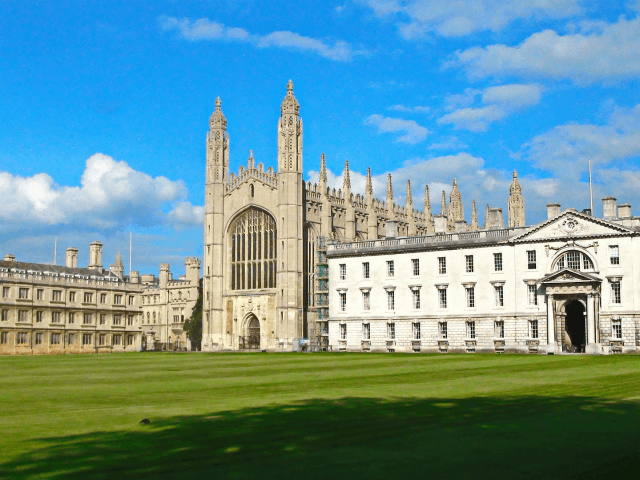Counter-terror police have warned Cambridge that it needs to do more to prevent vehicular terror attacks, as historic cities across the country introduce anti-terror barriers along their cobbled streets.
The counter-terror police report, requested by Cambridge City Council to “assess the vehicular borne threat to Cambridge, and advise on how this might best be mitigated,” found “a number of existing vulnerabilities to a potential attack” and recommended traffic control measures for certain areas, reports CambridgeshireLive.
The Counter Terror Unit (CTU) said that there is no specific threat against the medieval city, but that the threat “nationally, is real” — a sobering reminder that whilst a number of mainly Islamist vehicular terror attacks have been committed in London, any major city could be targetted, as well.
One part of the city identified as of “urgent concern” was on King’s Parade, which is home to King’s College (pictured) and its chapel, world-renowned for its choir.
The “principle and urgent recommendation emerging is the need to better control traffic access from the south along Trumpington Street,” the report reads, and recommends “chicane-style arrangements… and a physical barrier north of Bene’t Street that would resist penetration by a vehicle approaching at speed.”
Armed Police Now Guarding Canterbury Cathedral after French Priest Attack https://t.co/uJLjCxVncd pic.twitter.com/CO0CtaD6Fy
— Breitbart London (@BreitbartLondon) September 29, 2016
Cambridge is not alone in having to take precautions to reduce the impact of a terror attack, with Windsor, Oxford, York, and Edinburgh already having measures in place.
Late last year, Oxford’s council warned that the university city was at risk of terror attacks because of its international reputation.
“There are several areas where large numbers of people congregate – primary shopping areas and tourist attractions, transport hubs – that may be conducive and prone to attack,” the council noted on its risk register.
Traffic restrictions, including bollards, have been erected across the walled medieval city of York, with a dozen stone blocks put in place around its cathedral, York Minster, with some streets set to be made entirely vehicle-free.
At the end of January, it was announced the medieval city of Canterbury, home to the seat of the worldwide Anglican communion and three universities, would also be introducing a series of terror-prevention measures.
🎁🎄🎁 What better Christmas gift has diversity given us than reinforced cast concrete ❤️❤️❤️ https://t.co/txhTkFBZ4R
— Breitbart London (@BreitbartLondon) November 26, 2017
More than 100 anti-terror bollards are set to be built across 18 locations Canterbury, the heart of which surrounding the historic cathedral is mostly pedestrianised, the project set to cost the small city’s taxpayers £660,000.
Canterbury cathedral has already had armed police officers sporadically guarding its Christ Church gate since 2016, following a spate of terror attacks in Europe.
University of Kent emeritus professor, sociologist, and author Dr Frank Furedi said that the proposals were “over the top,” saying that the best way to deal with the threat of terrorism is “better policing rather than putting up permanent bollards which will not stop terrorists.”
Others have remarked on the impact that the measures will have on their cities, with many complaining the barriers are ugly, threaten the archaeological heritage of medieval streets, and affect the way people make their way around their hometowns — despite assurances from politicians after every Islamist attack in London and Manchester that terrorism would not change the way Britons live their lives.

COMMENTS
Please let us know if you're having issues with commenting.